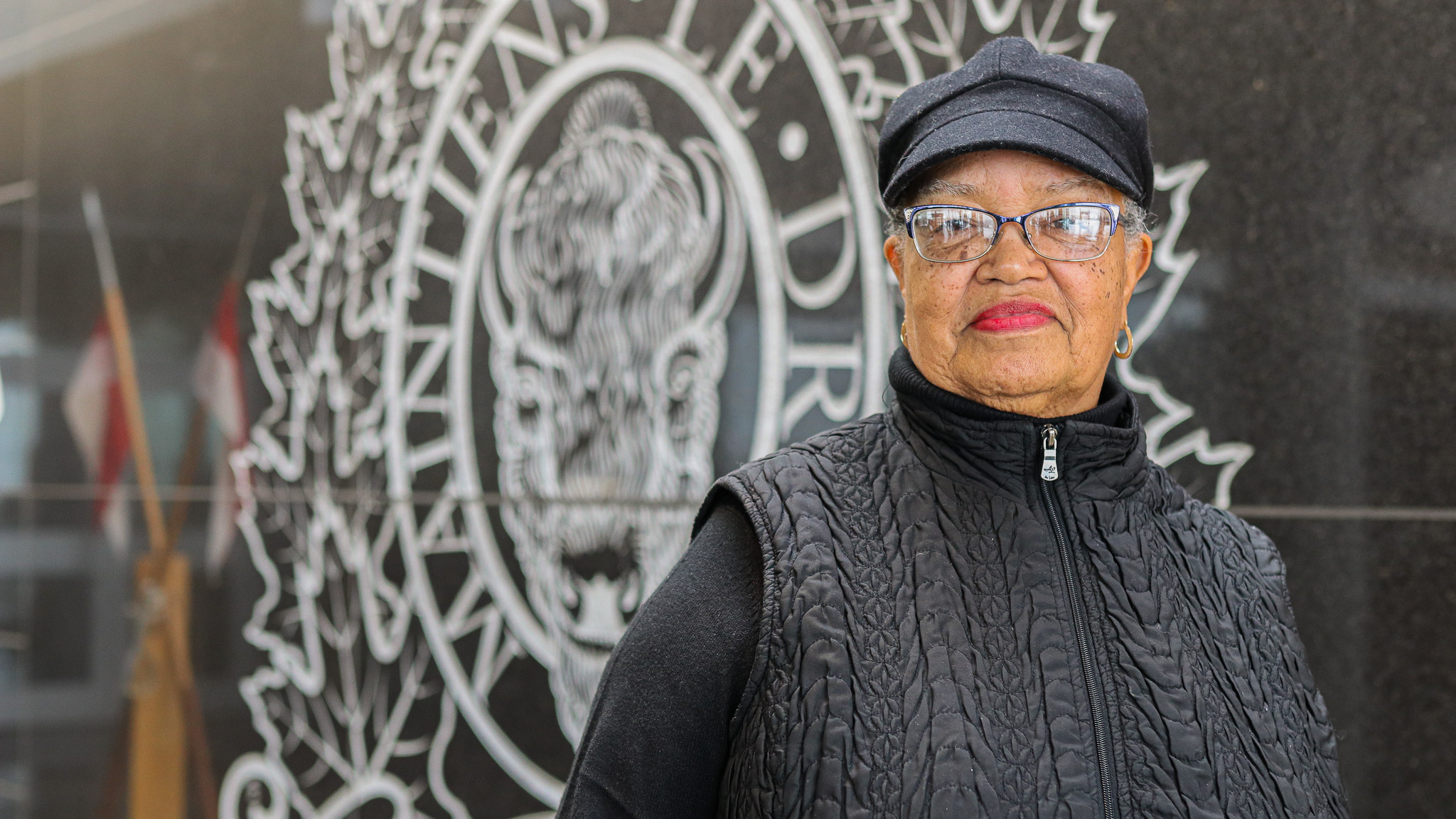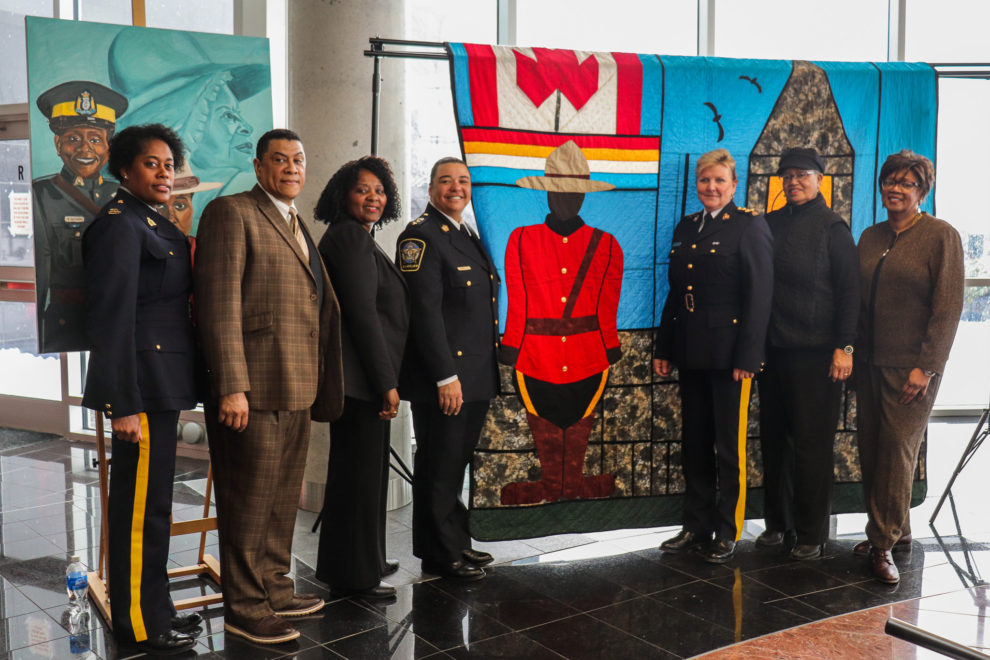‘We need to do more’: black women underrepresented in RCMP
New book ‘Her Story’ focuses on the small but notable number of black women Mounties

caption
Carolyn Thomas spoke at the Feb. 13 event for Her Story at the RCMP Nova Scotia Headquarters in Dartmouth. She was a member of the RCMP Nova Scotia Black & Racially Visible Advisory Committee.It was only six years ago when Leanne Sample, then a sergeant in the RCMP, was faced with a woman asking to speak to “the little black girl.”
Now, Sample is a deputy chief sheriff. She was the first black Nova Scotian to join the RCMP in 1992.
On Thursday, Sample spoke of her experience working in the RCMP at the police force’s Nova Scotia headquarters in Dartmouth. She’s one of 40 black women whose stories are being told in the upcoming book Her Story. Authored by RCMP Sgt. Craig Smith, the book tells the stories of how these women have contributed to Canadian law enforcement.
Being featured in the book is special for Sample.
“It’s something that I treasure to hand down to my daughter so that she can see that there are strong black women across the country as role models and to look up to,” Sample said in an interview. “So, it’s really special for me to be able to hand it back down.”
Out of more than 19,000 regular members in the RCMP, 300 are black and 60 are black women. Black women make up less than one per cent.
Sample said “adapt and overcome” is her mantra.
“It’s about telling people that, yes, you have adverse conditions, and things that we’ve gone through in the past are not necessarily what’s going on now,” she said. “Things get handed to you and you move on and you become part of the story or part of the history of what is happening. So, it’s about resilience.”
Sample was born in Hartford, Conn. When she was young, she moved to the Musquodoboit area in Nova Scotia with her mother. She attended elementary school and high school in Middle Musquodoboit, and said she was one of three black children in her school.
When she got into policing, things were different. She said her troop was called the “United Nations” because its 24 members represented a mix of different backgrounds.
‘Has to be inclusive’
To this day, there have only been two female RCMP commissioners, the highest rank in the organization. Beverly Busson was the first woman appointed in 2006, while the second woman is the current commissioner, Brenda Lucki. There has never been a black commissioner, let alone a black woman commissioner.
“We need to do more,” said Carolyn Thomas, one of the speakers at Thursday’s event. “If we’re talking diversity, then we have to show it, and it has to be inclusive.”
Thomas once served as a member of the RCMP Nova Scotia Black & Racially Visible Advisory Committee. She was also on the RCMP National Advisory Committee.
She said she’s looking forward to the day when black women are sitting at the same table where decisions are made and can bring about real change.
“I think that their presence has to be shown in the community, which would be more encouraging for women but for black people in general,” Thomas said. “Since this is [African Heritage Month], I think that we should be doing as much as we can to get people more involved.”
Thomas was born and raised in East Preston. She said she faced racism and noted that there’s still institutional and systemic racism.
“I didn’t see anybody that looked like me,” she said. “Therefore, I’m thankful that I had role models in my home, from my parents to my grandparents before them and so on. But in the workplace? That was non-existent. In the education system? That was not taught.
“This is a new day, this is 2020. We want people to be able to express themselves, and to be respected and appreciated, and their great resources utilized to help to make the RCMP an even better place. We all need improvement.”

caption
Attendees and speakers pose with Letitia Fraser’s painting and Myla Borden’s quilt.Behind the speakers, a quilt and painting commemorating black people in law enforcement were on display. The quilt, called If These Walls Could Talk, was made by Myla Borden. It features a black Mountie standing beside a brick building.
The painting was made by Letitia Fraser, a NSCAD University graduate. The painting features Rose Fortune (the first female police officer in Canada), Insp. Sherley Goodgie (the first black female sergeant-major in the history of the RCMP), Const. Carline Fidele (an RCMP member in Quebec) and Const. Shelley Peters (who in 1982 became the first black female RCMP member in the country).
‘Segregated’ history
Her Story’s author, Sgt. Craig Smith, said the RCMP has made progress. In 1967, Hartley Gosline was the first black male member to become a Mountie. In 1982, Shelley Peters became the first black woman Mountie.
Still, there’s more work to be done. Smith said when people talk about police officers, it’s usually about black police officers as a whole, or just black male members.
With Her Story, Smith said he wanted to focus on black women who are the smaller underrepresented group within the larger underrepresented groups.
“It’s really important for me to try and tell their story and give them a voice so that folks know about their contribution to Canada’s national police force,” Smith said.
“In a lot of cases, we look at Canadian history and we’ve allowed it to become segregated to a degree. So, we look at Canadian history then we look at black history. We don’t look at them as being a collective.
“Ours is a piece of Canadian history.”
About the author
Chris Stoodley
Chris is a fourth-year student at the University of King's College. He's a big fan of all things visual and loves to keep up with the world of...
